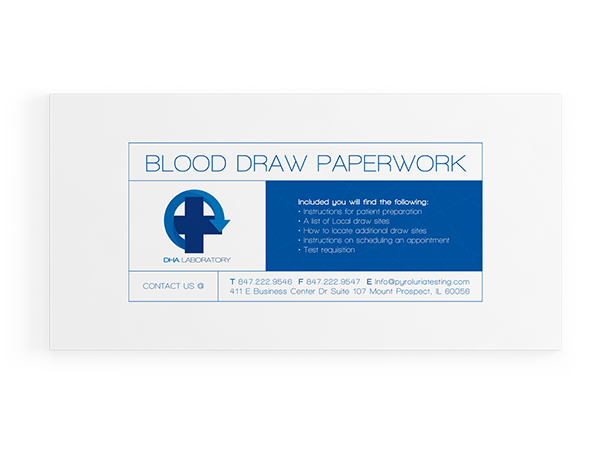Lab Testing
Product Description
**Note: All laboratory testing requires an authorizing physician. DHA Laboratory offers a patient direct program that partners you with an authorizing physician. If you have any additional questions regarding the availability of testing, please contact our laboratory by telephone or email.**
The Advanced Thyroid Panel
TSH + Free T3 + Free T4 + Total T4 + Reverse T3 + Total T3 + T3 Uptake + Thyroglobulin Ab + TPO, Ab
TSH (Thyroid Stimulating Hormone) is the most common test used to evaluate thyroid function and symptoms related to a thyroid disorder such as hyperthyroidism, or hypothyroidism. Produced by the pituitary gland, the primary role of TSH in the body is to stabilize amounts of T4 (thyroxine) and T3 (triiodothyronine) in the blood. This process controls how much energy the body burns.
The TSH test is often ordered to:
- Diagnose thyroid disorders
- Check for underactive thyroid in newborn children
- Evaluate thyroid replacement therapy
- Evaluate anti-thyroid treatment
- Screen adults for thyroid disorders
The TSH test is often ordered with a free T4 test, free T3 test, and/or thyroid antibodies. These tests can be ordered together in a panel called a thyroid panel.
Symptoms related to hyperthyroidism include anxiety, weight loss, shaking, weakness, sensitivity to light, or eye problems (swollen eyes, irritation/dryness).
Symptoms related to hypothyroidism include swollen skin, tiredness/fatigue, hair loss, weight gain, dry skin, or irregularity with menstruation in women.
Individuals who are being treated for a thyroid disorder often have the TSH test ordered at regular intervals. It is also ordered when an individual has an adjustment in their thyroid medication. The American Thyroid Association recommends that patients wait 6-8 weeks after adjusting medication before they retest thyroid stimulating hormone levels.
Free T3 (Free Triiodothyronine) is used to evaluate thyroid function and also in the assessment of abnormal binding protein disorders. Measurement of Free T3 is valuable in confirming the diagnosis of hyperthyroidism, when an elevated free or total thyroxine level is found. Abnormal total and free triiodothyronine concentrations may appear in T3 toxicosis, in the presence of normal thyroxine levels. The levels of free T3 are unaffected by carrier protein variation.
Free (Thyroxine) T4 can sometimes be indicated when binding globulin (TBG) problems are perceived, or when conventional test results appear inconsistent with clinical observations. It is common in subjects with high thyroxine-binding globulin hormone binding who are euthyroid (ie, free thyroxine should be normal in non-thyroidal diseases). It should appear normal in familial dysalbuminemic hyperthyroxinemia.
Total T4 is a thyroid function test. Total T4 is decreased in hypothyroidism and in the third stage of (painful) subacute thyroiditis. It is increased with hyperthyroidism, with subacute thyroiditis in its first stage, and with thyrotoxicosis caused by Hashimoto disease. Total T4 is also used to diagnose T4 toxicosis.
Reverse T3 is a biologically inactive form of T3. When T4 is converted to T3 in the body, a certain percentage of the T3 is in the form of RT3. When the body is under stress, thyroid hormone levels may be outside of normal ranges even though there is no thyroid disease present. RT3 may be elevated in non-thyroidal conditions, particularly the stress of illness.
T3 Total (Triiodothyronine) is needed in patients who have clinical evidence for hyperthyroidism, in whom the usual thyroid profile result is reported as normal or borderline. The T3 Total test is recommended for patients with supraventricular tachycardia, for patients with fatigue and weight loss not otherwise explained, or for patients with proximal myopathy who also have T4 levels that are not elevated.
T3 Uptake is a thyroid function test for the diagnosis of hypothyroidism or hyperthyroidism, used with thyroxine (T4) or equivalent to provide free T4 index, (FTI). An indirect measure of binding protein, the T3 uptake shows available binding sites (ie, reflects TBG). T3 uptake is not a measurement of T3 serum. T3 Uptake should never be used alone due to the fact that its usual application is used with thyroxine (T4).
Thyroglobulin Ab is primarily used to detect and confirm autoimmune thyroiditis, Hashimoto thyroiditis.
Thyroid Peroxidase (TPO) Ab is used in the differential diagnosis of hypothyroidism and thyroiditis.
Patient Preparation: Discontinue any supplements containing Biotin for 72 hours prior to specimen collection.

